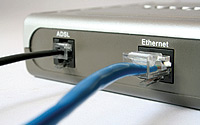Web Users Pick Up Speed, ISP's DSL Service Sketchy
- by Wendy Davis @wendyndavis, February 15, 2013
 Internet connections grew speedier last
year, according to a new Federal Communications Commission report.
Internet connections grew speedier last
year, according to a new Federal Communications Commission report.
The average subscriber speed in September reached 15.6 Mbps, marking a 20% increase from April, the FCC says in its third Measuring Broadband report. In some cases, visitors are accessing the Web at speeds of up to 75 Mbps, the agency says. The report is based on measurements of home-broadband speeds of around 10,000 volunteers.
The FCC also found that some ISPs are narrowing the gap between the speeds they advertise and deliver, but that significant differences still persist in some cases. ISPs that offer DSL service -- generally slower than cable modems or fiber optics -- only achieve an average of 85% of their advertised speeds for downloads from 7 p.m. to 11 p.m on weeknights.
That marks a slight improvement from July, when DSL providers achieved just 84% of advertised speeds during those peak Internet hours.
Cable companies achieved 99% of advertised downstream speeds on weeknight evenings, while fiber optic providers delivered 115% of advertised speeds. While that latter figure seems impressive, it actually marks a drop from 117% in April.
The report, which examined 13 specific providers, names seven companies with less than 90% of advertised speeds: AT&T, CenturyLink, Frontier, Insight, Qwest, Verizon (DSL) and Windstream. (Despite not meeting the ad promises, Frontier improved significantly from the last report. In September, Frontier achieved an average of 87% of advertised download speeds, while last April it only achieved 77%.)
The industry-funded group Internet Innovation Alliance says that the report shows that the broadband market is "highly competitive" and that market forces are "driving private investment that is rapidly upgrading America's network infrastructure."
But advocacy group Free Press points out that many subscribers still aren't receiving the Web service as advertised. "In this market prices are not decreasing, and if you're a customer of the DSL provider like AT&T, you never get what you pay for," says Free Press research director S. Derek Turner.
"Modem photo from Shutterstock"


